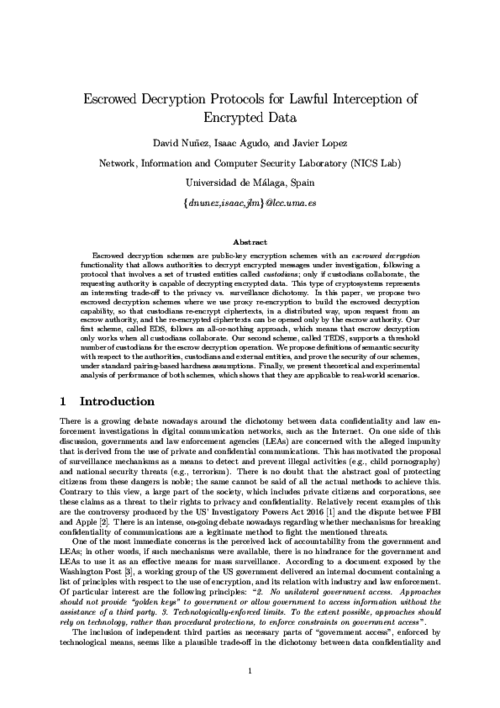 ] Title Type Year
] Title Type Year International Journal of Information Security, vol. 13, issue 2, Springer, pp. 199-215, 2014. DOI
Abstract
Identity management is an almost indispensable component of today’s organizations and companies, as it plays a key role in authentication and access control; however, at the same time it is widely recognized as a costly and time-consuming task. The advent of cloud computing technologies, together with the promise of flexible, cheap and efficient provision of services, has provided the opportunity to externalize such a common process, shaping what has been called Identity Management as a Service (IDaaS). Nevertheless, as in the case of other cloud-based services, IDaaS brings with it great concerns regarding security and privacy, such as the loss of control over the outsourced data. In this paper we analyze these concerns and propose BlindIdM, a model for privacy-preserving IDaaS with a focus on data privacy protection. In particular, we describe how a SAML-based system can be augmented to employ proxy re-encryption techniques for achieving data condentiality with respect to the cloud provider, while preserving the ability to supply the identity service. This is an innovative contribution to both the privacy and identity management landscapes.
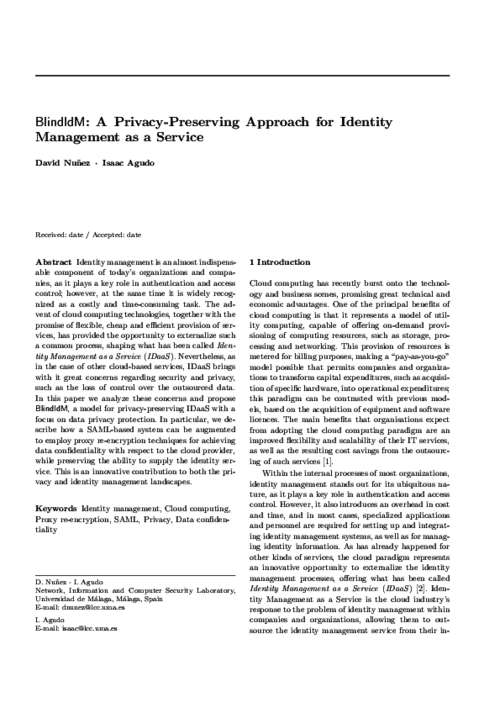
Accountability and Security in the Cloud, M. Felici, and C. Fernandez-Gago Eds., Lecture Notes in Computer Science 8937, Springer International Publishing, pp. 114-125, 2015. DOI
Abstract
In this paper we tackle the problem of privacy and confidentiality in Identity Management as a Service (IDaaS). The adoption of cloud computing technologies by organizations has fostered the externalization of the identity management processes, shaping the concept of Identity Management as a Service. However, as it has happened to other cloud-based services, the cloud poses serious risks to the users, since they lose the control over their data. As part of this work, we analyze these concerns and present a model for privacy-preserving IDaaS, called BlindIdM, which is designed to provide data privacy protection through the use of cryptographic safeguards.
1st International Workshop on Security and Trust for Applications in Virtualised Environments (STAVE 2011), vol. 187, pp. 198-204, June, 2011. DOI
Abstract
Intercloud notion is gaining a lot of attention lately from both enterprise and academia, not only because of its benefits and expected results but also due to the challenges that it introduces regarding interoperability and standardisation. Identity management services are one of the main candidates to be outsourced into the Intercloud, since they are one of the most common services needed by companies and organisations. This paper addresses emerging identity management challenges that arise in intercloud formations, such as naming, identification, interoperability, identity life cycle management and single sign-on.
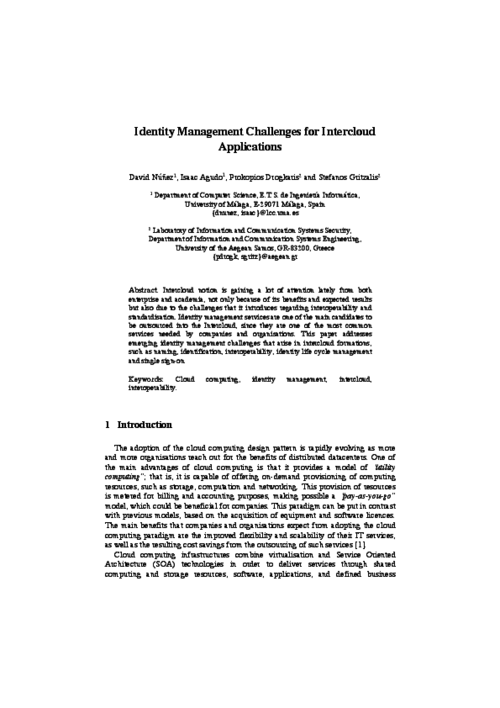
IEEE CloudCom 2012, IEEE Computer Society, pp. 241 - 248, Dec 2012. DOI
Abstract
The inclusion of identity management in the cloud computing landscape represents a new business opportunity for providing what has been called Identity Management as a Service (IDaaS). Nevertheless, IDaaS introduces the same kind of problems regarding privacy and data confidentiality as other cloud services; on top of that, the nature of the outsourced information (users’ identity) is critical. Traditionally, cloud services (including IDaaS) rely only on SLAs and security policies to protect the data, but these measures have proven insufficient in some cases; recent research has employed advanced cryptographic mechanisms as an additional safeguard. Apart from this, there are several identity management schemes that could be used for realizing IDaaS systems in the cloud; among them, OpenID has gained crescent popularity because of its open and decentralized nature, which makes it a prime candidate for this task. In this paper we demonstrate how a privacy-preserving IDaaS system can be implemented using OpenID Attribute Exchange and a proxy re-encryption scheme. Our prototype enables an identity provider to serve attributes to other parties without being able to read their values. This proposal constitutes a novel contribution to both privacy and identity management fields. Finally, we discuss the performance and economical viability of our proposal.
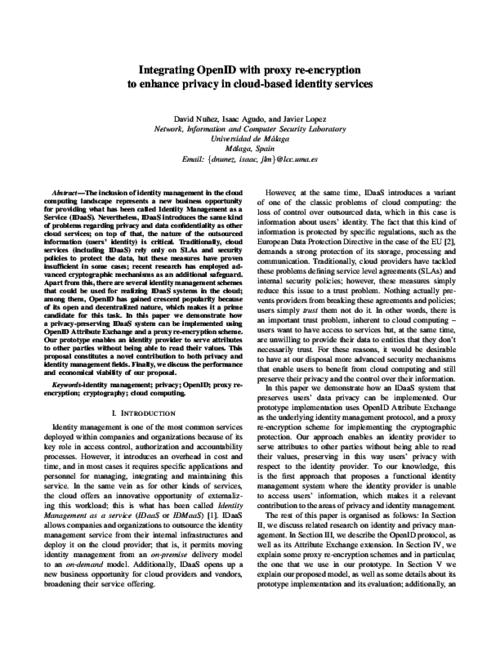
Ph.D Symposium of the European Conference on Service-Oriented and Cloud Computing (ESOCC) 2013, September 2013.
Abstract
The advent of cloud computing has provided the opportunity to externalize the identity management processes, shaping what has been called Identity Management as a Service (IDaaS). However, as in the case of other cloud-based services, IDaaS brings with it great concerns regarding security and privacy, such as the loss of control over the outsourced data. As part of this PhD thesis, we analyze these concerns and propose BlindIdM, a model for privacy-preserving IDaaS with a focus on data privacy protection through the use of proxy re-encryption.
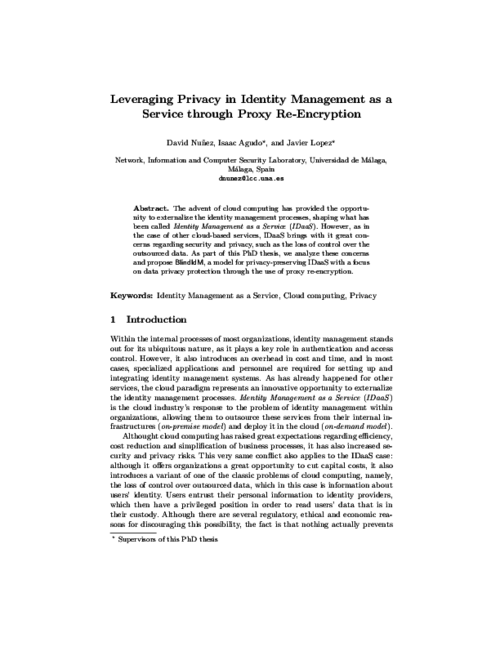
IET Information Security, vol. 13, issue 5, IET, pp. 498 -- 507, 09/2019.
Abstract
Escrowed decryption schemes (EDSs) are public-key encryption schemes with an escrowed decryption functionality that allows authorities to decrypt encrypted messages under investigation, following a protocol that involves a set of trusted entities called `custodians'; only if custodians collaborate, the requesting authority is capable of decrypting encrypted data. This type of cryptosystem represents an interesting trade-off to privacy versus surveillance dichotomy. In this study, the authors propose two EDSs where they use proxy re-encryption to build the escrowed decryption capability, so that custodians re-encrypt ciphertexts, in a distributed way, upon request from an escrow authority, and the re-encrypted ciphertexts can be opened only by the escrow authority. Their first scheme, called EDS, follows an all-or-nothing approach, which means that escrow decryption only works when all custodians collaborate. Their second scheme, called threshold EDS, supports a threshold number of custodians for the escrow decryption operation. They propose definitions of semantic security with respect to the authorities, custodians and external entities, and prove the security of their schemes, under standard pairing-based hardness assumptions. Finally, they present a theoretical and experimental analysis of the performance of both schemes, which show that they are applicable to real-world scenarios.
